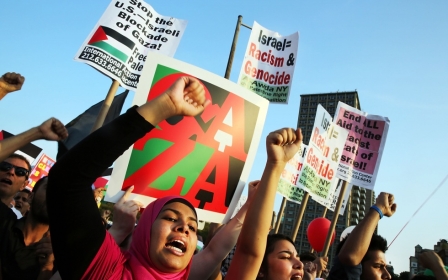Israel 'satisfied' as Palestinian UN resolution fails

Israel expressed satisfaction on Wednesday after the UN Security Council failed to adopt a resolution on Palestinian statehood setting a 12-month deadline for reaching a final peace deal.
"Every Israeli who wants peace with our neighbours can only be satisfied with the results of this vote," deputy foreign minister Tzahi HaNegbi told public radio several hours after the resolution failed to pass within the 15-member council.
"This deals a blow to efforts by (Palestinian president) Mahmud Abbas to embarrass and isolate us," said HaNegbi, a close associate of Prime Minister Benjamin Netanyahu.
Eight countries voted in favour, among them three of the council's five permanent members -- China, France and Russia -- but the resolution fell short of winning the nine "yes" votes necessary for adoption in the 15-member council.
Australia and the United States voted against.
The United Kingdom, Nigeria, Rwanda, South Korea and Lithuania abstained from voting, while Jordan, France, Russia, China, Argentina, Chad, Chile and Luxembourg voted in favour.
The resolution sets the end of 2017 as the deadline for Israel to fully withdraw from the occupied territories and to declare East Jerusalem as the capital of a future Palestinian state based on the pre-1967 borders.
Israeli Foreign Minister Avigdor Lieberman said Palestinian attempts to secure their long-awaited state through "unilateral" moves at the United Nations would never achieve anything.
"The failure of the Palestinian vote at the Security Council should teach the Palestinians that provocations and attempts to force Israel into unilateral processes will not achieve them anything -- quite the opposite," he said in a statement.
He denounced the countries which backed the resolution, particularly "some European states". Tiny Luxembourg joined France in voting for the text.
Lieberman said any state which wanted to see an end to the decades-old Middle East conflict "must act with responsibility and make clear to the Palestinians that decisions can only be taken around the negotiating table."
Public radio said although Israel had narrowly avoided a fiasco, it was only "a short-term victory" which would not halt international pressure for a peace deal with the Palestinians.
The Palestinians have warned that if the resolution failed, they would seek to join a number of international organisations including the International Criminal Court, where they could sue Israeli officials for war crimes.
US-brokered direct Palestinian-Israeli talks came to a halt in April when Israel refused to release a group of Palestinian prisoners despite earlier pledges to do so.
The roots of the Israel-Palestine conflict date to 1917, when the British government, in the now-famous "Balfour Declaration," called for "the establishment in Palestine of a national home for the Jewish people."
Israel occupied East Jerusalem and the West Bank during the 1967 Middle East War. It later annexed the holy city in 1980, claiming it as the capital of the self-proclaimed Jewish state – a move never recognized by the international community.
Palestinians want a state of their own in the Gaza Strip and the West Bank, with East Jerusalem, currently occupied by Israel, as its capital.
New MEE newsletter: Jerusalem Dispatch
Sign up to get the latest insights and analysis on Israel-Palestine, alongside Turkey Unpacked and other MEE newsletters
Middle East Eye delivers independent and unrivalled coverage and analysis of the Middle East, North Africa and beyond. To learn more about republishing this content and the associated fees, please fill out this form. More about MEE can be found here.




